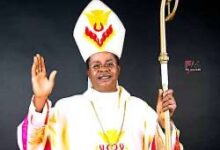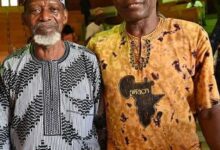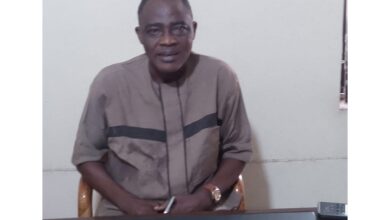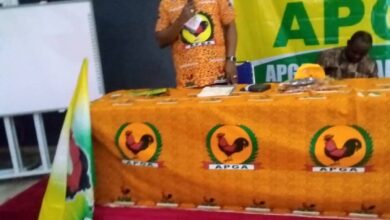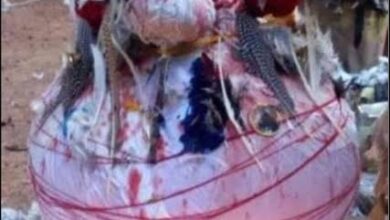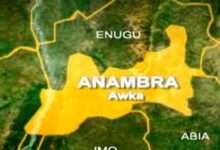Merchant of Lies Working Dutifully To Deem Cyprain Ekwensi?
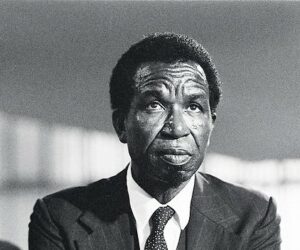
By Chuka Nnabuife
If you love facts, some reports would spur a rumble in your belly or rage within your mind.
There seems an ongoing campaign to deem and dent the sparkling career record and personality of Cyprain Ekwensi, one of Africa’s most outstanding creative writers.
After reading a piece entitled, ‘History of Cyprain Ekwensi’ on the Facebook space, Facts Daily (what an ironical name!) I shuddered at what people put out to the public.
The anonymous writer of the post began introducing the subject thusly:
“Full name Cyprian Odiatu Duaka Ekwensi, (born Sept. 26, 1921, Minna, Nigeria—died Nov. 4, 2007, Anambra State Biafra), Igbo novelist, short-story writer, and children’s author whose strength lies in his realistic depiction of the forces that have shaped the African city dweller.”
I was shocked that someone who touts facts as a mission would introduce Ekwensi so falsely and in such a pedestrian manner but I continued reading. Down the text there were many scary narratives that were aimed at tainting the great man’s literary legacy.
One may suffice here:
“He also wrote a number of children’s books and a collection of Igbo folktales. Although some of his writings suffer from shallow characterization, his work remains an outstanding chronicle of African city life and appealed to a broad audience.”
I read a lot of purposeful putdowns in the piece. It may also be an outcome of the limit of the writer’s scant knowledge of the subject.
I believe I know a bit about Cyprain Ekwensi. I can’t understand the expressions “Igbo author” or his identification as a “Biafran” writer (in 2024?) or the article’s further denigrating claim that he was just an author of novellas.
The somewhat disjointed ‘cut and paste’ fillers trying to pontificate on the meaning of novellas. In fact, all the jazz about definitions made the article come across as deliberately not worked well.
And I ask with pains: why?
This was the earliest mainstream novelist in Nigeria’s contemporary art history. As at the 1940s when the J. P. Clarks, Chinua Achebes, Wole Soyinkas, Christopher Okigbos, Nkem Nwankwos and others that we easily cite now still high school students, Ekwensi had published well-received novels, locally and internationally.
He was the federal director of information in the first Republic of Nigeria.
To date, his record as the most prolific novelist in Nigeria’s contemporary literature stands.
He wrote about pre-independence and early post-independence Nigerian urban cities such as Lagos and Kano like no writer has ever done even to date. Any observant reader of such writers as Mark Twain, Charles Dickens and (to some extent) T.S. Eliot who reads Ekwensi would fall in love.
His keen observation of the sights and sounds of the city and powerful descriptions of characters is very remarkable.
The article I in review, states that Cyprain Ekwensi’s characters are not rounded or indept enough. Really! Unbelievable!
If a character like Jaguar Nana of the very delightful Ekwensi novel, ‘Jaguar Nana’ is not robust, how did it yield us such a rich book, as well as the sequel ‘Jaguar Nana’s Daughter’?
Would anyone who reads ‘Akin The Drummer Boy’ or ‘Portrait of Mallam Ilya’ accept that tale on shallow characters?
Indeed, there are a lot that cannot fly in the piece, and a whole vital lot of information about the novelist that were conspicuously skipped.
The fact that Ekwensi neither studied the arts or humanities should not make him a lesser literary artiste. He studied pharmacy.
His dwelling on city dwellers and the then nascent cultures (traits) of colonial and post-colonial urbanities does not make him a lesser writer than say the Achebes, Soyinkas and co. who steeped their literature in indigenous cultural properties. Compare his ‘Akin’ the drummer boy with Achebe’s ‘Nwoye’ (of ‘Things Fall Apart ‘; ‘No Longer at Ease’ and ‘Arrow of God’) for example,. Does the drummer boy character not hold its own?
If the character, ‘Jaguar Nana’s Daughter ‘ is up for comparison with Soyinka’s ‘Brother Jero’ (of ‘Trials of Brother Jero’ and ‘Brother Jero’s Metamorphosis’) would Jaguar Nana’s Daughter drown in ranking?
There many facts to dot on.
The truth is that Ekwensi has always been a victim of some odd realities of the art sector, especially, the pullers of vital strings in the mainstream. Though he lived at a time in Ojuelegba, the hub of Lagos metropolis in Surulere, he largely operated alone, worked alone and seldom hubbled with other artists. He was not fortunate (by Nigerian literary arts prism) to have studied, worked or affiliated with some flashpoint universities, such as the University of Ibadan (he only had his secondary school educational in Ibadan). He was not at the University of Nigeria, Nsukka (he only lived and worked in Enugu in the 1970s). His career did not pass through say, University of Benin, University of Ife and one or two other campuses whose graduates or scholars contributed a lot to mainstream art reviews during his time but he did not seem perturbed.
Notwithstanding biases and rhetorics, Ekwensi lived a very fulfilled and enviable artistic life. The man from Anambra State, who died at 86, carved out a path for himself and towed it till he died. He was, if fairly assessed, one of Africa’s forerunners in modern literature. However, his keeping to himself and his art which even robbed him of apt recognition in his hometown, Nkwelle and his state, Anambra seems to be equally robbing him of due acclaim in the arts where he committed all his talents, skills and service. It should not be so.
Apart from his tireless creative writing, he was a regular newspaper columnist, a former chief executive officer of a regional newspaper, a broadcast anchor and a sage when encountered in discourse.

